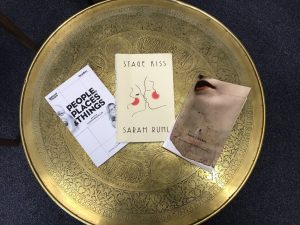When I first started working for Newcastle University, I taught on a module called ‘What is a Play?’ which had been designed by Prof. Peter Reynolds (who, sadly for us, because we miss him, is now retired). It was a beautiful little module designed to introduce students to reading plays by trying to catch a glimpse of what the performance they implied might have looked like. This then became ‘Reading in Action’, so-called 1) because we were trying to encourage students to put those plays on their feet and give them voice and movement, but also 2) because we wanted to be clear that we were not assessing acting ability, but instead critical engagement through creative practice. It turns out that the title ‘Reading in Action’ was about as clear as mud. Some of the students who took this module even thought they were going to be studying literary texts about soldiers and war (a different kind of ‘action’ entirely!) perhaps because we were, at that time, studying some plays that touched on conflict and the military, e.g. Black Watch by Gregory Burke. So about six years ago we re-wrote the module again and this time gave it a really straightforward title: Drama, Theatre and Performance.
The module in 2018/19
What is Drama, Theatre and Performance? Well, this is a module which looks closely at three contemporary plays and thinks about them in terms of three concepts which are central to all theatre performance: space, bodies and objects. The whole module is based upon an understanding that theatre performance is a creative act, in which real people and objects are presented to other people in a shared space. These are the plays we’re looking at this year: John Donnelly, The Seagull, adapted from Chekov (2013), Duncan Macmillan, People, Places and Things (2015), and Sarah Ruhl, Stage Kiss (2014).

The plays we’ll be working on in 2018/19, having a rest in my office.
They’re all plays which contain a play-within-a-play, and which ask us to think about what it means to perform — in our lives, as well as the theatre. The module is taught by two separate one hour lectures and a one and a half hour workshop each week. Students will be assessed on a proposal for a performance, which will be delivered in class (25%), a demonstration in which you lead a workshop activity related to one of the texts, again this will happen in class (25%), and a written reflective portfolio which will be submitted online (50%). This year Jamie Harper, a theatre director who is undertaking doctoral research at Newcastle University, has also designed some games for us to play in workshops — some of these you will recognise, some will involve building with objects, some will even involve paper and pens, and all of them should help you to gain further insight into the play texts.
What’s new?
There’s a rule of thumb that most academic staff follow with regards to their teaching, which is that it takes about three years to iron out the kinks of a new module — year three is the sweet spot when everything seems to fall into place for both staff and students — and then it gets progressively more stale every year you run it after that. But I’m not sure I agree with this logic. I really, really love the first year of a new module because although wondering if the content and the assessment I’ve designed will actually work in the way that I imagine it will can be nerve-wracking, it’s also always exciting. I find that the first year a new module runs is the year that I learn most from my students, maybe because I’m working everything out alongside them and so we’re on a more equal footing. And then there’s this module, which has been running for six years… six years?!… and so surely ought to be well past that sweet spot. But it really doesn’t feel like a six-year-old module, because it still has the feeling of being new. Partly that is because we’re changing little details all the time. And partly it is because, by it’s very nature, this is a module which leaves lots of room for student intervention. I’m always learning from the students who take this module, and it is covered in the fingerprints of everyone who has ever touched it — from the very irreverent and very flamboyant Prof. Reynolds, to the student who was visibly terrified at the fear I might make him ‘act’ in 2013/14 — this module is the product of ongoing collective effort.
This year, to shake things up for 2019, we’re embracing student intervention even more than usual and we’ve completely re-jigged the whole module to focus further on participation and even to give you, as students, an opportunity to influence how you are going to be assessed. But there will be more on that in the next post…
